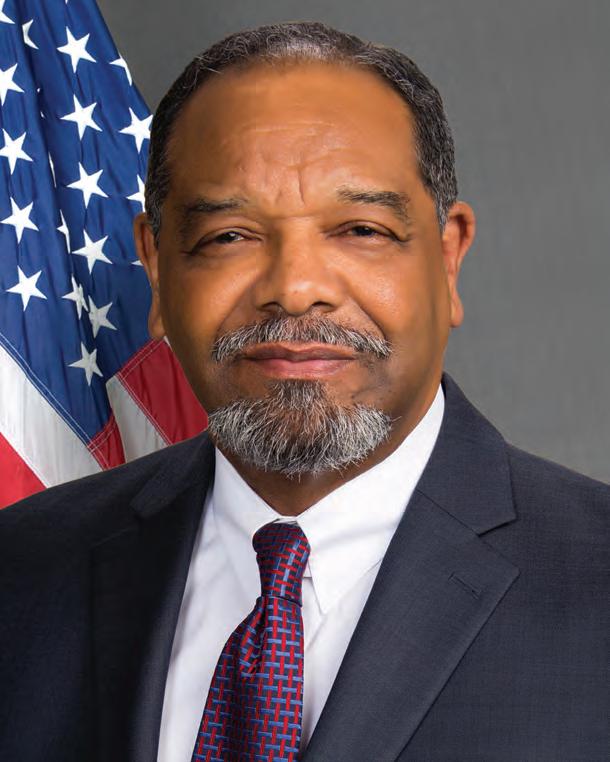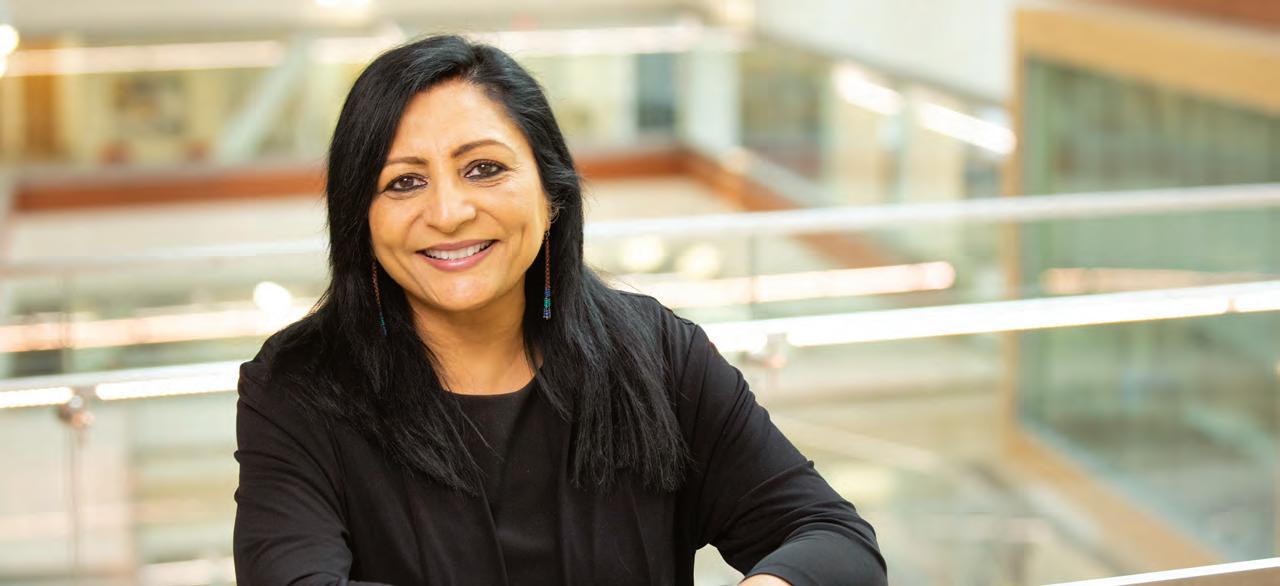
6 minute read
A MEDICAL EDUCATION SECOND TO NONE
by UBAA
BY MARK SOMMER
Gregory Antoine, MD
regory Antoine, MD ’76, has been both a trailblazer and a witness to history in a long and distinguished medical and military career that began with his having to confront formidable racial barriers while growing up in the South. At an age when many doctors are hanging up their stethoscopes, Antoine, 69, began a new position last September as chief medical officer and senior associate dean for clinical affairs at Morehouse School of Medicine in Atlanta, Georgia. “I wanted to take this job because I always wanted to work at a historic black college,” he says. “People are very excited about my being here, and think I have a skill set that matches what they need.” Surmounting racial barriers Antoine grew up in a military family. He was born in a military hospital in San Antonio, Texas, then there were stops that included Plattsburgh in upstate New York, Japan twice and the town of Pass Christian on Mississippi’s Gulf Coast. In Pass Christian, Antoine was the first AfricanAmerican to attend the whites-only high school. “When my dad told me I was going to a white high school, he said he felt I, as one of the first, should set an example,” says Antoine, a father of five. “I said I didn’t want to go, and he said he didn’t care, I was going.”
Antoine found sports to be a great equalizer with his peers and something that helped surmount racial barriers. “Athletics overcome a lot of things. I maintained a circle of friends—black kids and white kids—which was kind of unheard of then,” he recalls. “I remain friends with these guys to this day.” Antoine played quarterback on the junior varsity football team and cornerback on the varsity squad. He had 11 interceptions his junior year, but when it came time for names to be submitted for the state’s all-conference team, the head coach broke precedent by declaring that only seniors would be eligible. Dispirited by the blatant racism, Antoine didn’t go out for football his senior year despite interest from college recruiters. The story of how Antoine’s paternal grandfather died in 1947 after being refused admittance to a segregated hospital influenced the young man’s decision to become a physician.
“It was one of those things that, when you hear that sort of story, it lights a fire under you,” he says, adding that not much had changed by the time he graduated: waiting rooms in the local hospital were still segregated. Head and neck surgeon Gregory Antoine, MD ’76, looks back on an exceptional career, launched at UB G
A witness to history Antoine attended Jackson State College (now university) as a premed and biology major during a tumultuous time for the school and the nation. He was a freshman in 1968, the year the Tet Offensive in Vietnam took place, which caused the U.S. to escalate its involvement in Southeast Asia and antiwar protests across the country to explode. Shortly after midnight on May 15, 1970, after an evening of unrest, 14 students on the Jackson State campus were shot by city and state police, resulting in two deaths. The shootings occurred just 11 days after national guardsmen opened fire at Kent State University in Ohio, killing four students.
Antoine saw the police, armed with rifles, march in formation to Alexander Hall, a women’s dormitory and take their positions. He was about 60 feet behind them for the 30-second barrage of gunfire—smoke from their rifles was visible as the bullets discharged. “It was like in a movie,” he recalls. “I had never witnessed anything like this—people trying to kill other people.” Antoine was the first to reach a bleeding Phillip Gibbs, one of the two students who died. After he called for an ambulance, a policeman arrived and shouted, “There’s a n— shot.” Antoine later told a congressional committee in Washington, D.C., that he saw no acts of violence prior to the shooting, nor heard gunshots that some later claimed provoked the police into firing. He called for an investigation of the Mississippi Highway Patrol and met with John Ehrlichman, an advisor to President Nixon. Back in Jackson, he was part of a committee that organized a three-day boycott by black workers and shoppers of white businesses to express the black community’s outrage and anger over the shootings. Medicine and military service The Antoine family traces its military history back to the Revolutionary War, and Antoine wanted to serve despite his opposition to the Vietnam War. He passed a Navy recruiter’s test to be a pilot in case he didn’t get into medical school. However, when the Navy learned that he had been accepted to UB medical school, he was given a full scholarship, launching his military career. Antoine was excited to attend medical school at UB. “I was just really grateful that they accepted me and gave me the opportunity to be a doctor and fulfill my dream,” he says. “What I found out as I got more and more into being a doctor was that my exposure and training at UB was actually second to none.” Antoine found UB to be a supportive environment. Biochemistry professors Alastair Brownie, PhD, and Murray Ettinger, PhD, were particularly popular with minority students because of the personal interest they showed. Following graduation, Antoine was the first black surgical resident accepted at Millard Fillmore Hospital. After residency, he went on active duty, serving on a submarine base in New London, Connecticut, where he was a general medical officer. It was the first of numerous assignments in a career that saw him switch from the Navy to the Army and rise in rank to colonel with the United States Army Medical Corps. Along the way, Antoine returned to UB to undergo subspecialty training in otolaryngology, which he completed at Walter Reed Army Medical Center. A trailblazer in academic medicine Antoine went on to work as chief of otolaryngology for head and neck surgery at Blanchfield Army Community Hospital in Fort Campbell, Kentucky. At Tripler Army Medical Center in Honolulu, Hawaii, he served as assistant chief and co-director of residency training, and later, as director of the head and neck surgery clinics. A residency in plastic and reconstructive surgery at Georgetown University School of Medicine was followed by a fellowship in craniomaxillofacial surgery at Eastern Virginia Graduate School of Medicine. That training led to his being named residency director of otolaryngology and medical director of the maxillofacial trauma section at Case Western University’s School of Medicine’s Metro Health Medical Center in Cleveland, Ohio. Boston University School of Medicine beckoned next. There, Antoine served as chair of the Department of Plastic and Reconstructive Surgery from 2001 to 2013, becoming the first African-American to serve in this capacity outside of a historically black medical school. In 2013, he excepted a position as chief of staff for the Department of Veterans Affairs in Fayetteville, North Carolina. Over the years, Antoine pursued advanced degrees to further his administrative competence, earning an MBA at the University of Tennessee at Knoxville, an MS degree at Brandeis University in Waltham, Massachusetts, and a master of public administration from the University of North Carolina at Chapel Hill. Looking back on a rich and varied career, Antoine says he owes a debt to the medical education and training he received in Buffalo. “UB gave me a strong foundation to succeed in my medical career, no matter what I was doing, and I have enjoyed my career. “ “What I found out as I got more and more into being a doctor was that my exposure and training at UB was actually second to none.”
— GREGORY ANTOINE, MD ’76







